The global meat-based flavors industry was valued at $3.4 billion in 2021, and is projected to reach $6 billion by 2031, growing at a CAGR of 5.8% from 2022 to 2031.
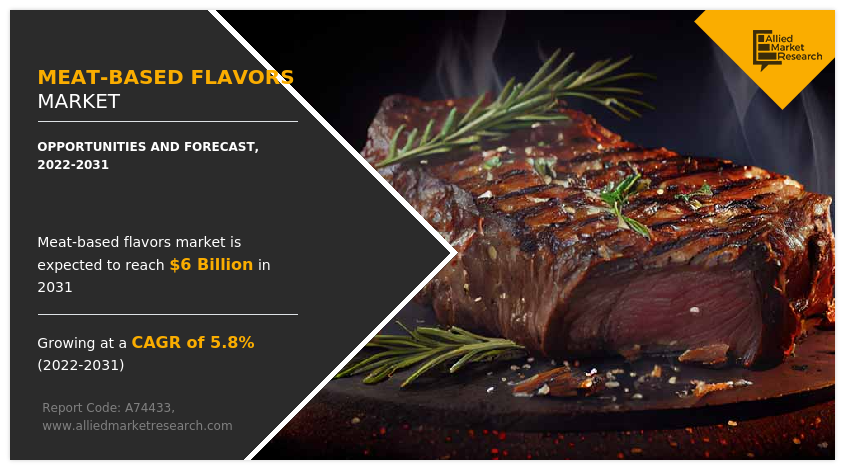
Market Dynamics
The meat-based flavor is a rapidly growing industry that caters to the needs & preferences of meat-loving consumers. There are a wide range of products ranging from natural meat extracts & flavorings to synthetic and artificial meat flavorings. The demand for meat flavorings has increased in recent years due to several factors, including growth in popularity of plant-based & vegetarian diets, growth in demand for ready-to-eat foods and meat-based flavors market size.
One of the major drivers of the meat-based flavor market is rise in interest in plant-based & vegetarian diets. As large number of consumers realize the health & environmental benefits of reducing meat consumption, they are looking for meat alternatives that replicate the taste of real meat. Meat seasonings play a vital role in the development of these products as they help create a more authentic and satisfying meat experience. Plant-based meat substitutes using meat flavorings have grown in popularity in recent years and are expected to continue to be popular as more consumers seek out healthy & sustainable food options.
The World Health Organization has determined that processed meat is a major contributor to colorectal cancer, classifying it as ’carcinogenic to humans’. Just one hot dog or a few strips of bacon consumed daily increases cancer risk by 18%. The World Cancer Research Fund (WCRF) and the American Institute for Cancer Research (AICR) have also found evidence on link between processed meat and cancer.
Moreover, processed meat is linked to cardiovascular disease and death. According to a National Health Library study that found people eating more than 150 grams of processed meat per week increased their risk of heart disease and death by 46% and 51%, respectively, when compared to those who did not eat processed meat. A National Institutes of Health study of more than half a million people too found that those who consume the most processed meat have an increased risk of death from cardiovascular disease, such factors surge the Meat-Based Flavors Market Share.
Moreover, consumers are busier than ever and are looking for quick & easy meal solutions that do not compromise on taste or quality. Meat seasonings are commonly used in processed & ready-to-eat foods, such as snack foods, soups, and sauces, to enhance their flavor & appeal to consumers looking for convenient & satisfying meal options. As the demand for convenience foods continues to grow, the market for meat-based flavors too, is expected to witness further growth.
Further, the demand for tastier food options is driving the growth of the meat-based flavor market. Consumers are looking for foods that are not only healthy & convenient but also delicious. Meat seasonings are often used in gourmet & high-end foods to create a more flavorful experience. Further, they are used in traditional meat products to enhance their flavor & appeal to consumers looking for a more indulgent dining experience.
Growth in demand for convenience foods such as frozen dinners, prepackaged meals, and ready-to-eat snacks has dramatically increased the demand for meat-based flavors in the market. Consumers looking for quick & easy meal solutions are often drawn to meat-flavored foods as they tend to convey a sense of satisfaction. In addition, on-the-go lifestyle of modern consumers has led to increase in on-the-go snacking, which has further increased the demand for meat-based flavors in portable snacks. Meat seasonings such as beef, chicken, and pork are often used to enhance the flavor of snacks such as chips, cookies, and popcorn.
On the contrary, consumers are increasingly aware of the health benefits of natural & minimally processed foods. They are concerned about the use of synthetic additives, preservatives, and flavorings in their food products and are looking for products made from natural & clean ingredients. Clean label ingredients have increased the demand for meat-based flavor as large number of consumers look for natural, healthy, and recognizable ingredients in their food products. Clean label ingredients are minimally processed and contain no artificial colors, flavors, preservatives, or additives. Furthermore, they are increasingly aware of the environmental impact of the food that they eat. The production of meat & meat products has a significant impact on the environment and consumers are looking for products produced using sustainable & environmentally friendly methods. Changing consumer preferences and food trends are driving the demand for natural & clean ingredients in the meat condiment market. Many consumers are adopting vegetarian & vegan diets, or reducing their meat intake, and are looking for meat alternatives made from natural, homemade ingredients.
The rise in concern among consumers about the long-term health effects of artificial ingredients & additives in food products has increased the demand for natural & healthy ingredients, which majorly drives the growth of the meat-based flavor market. Other major drivers in the market include growth in disposable incomes, rise in demand for unique flavors in various food applications, and surge in the popularity of exotic flavors.
Apart from this, meat-based flavor manufacturers have been adopting new technologies to produce better varieties of natural & artificial flavors to increase their stability & suitability. For instance, producing fruit flavors is a complicated task as the original taste & flavor is reduced during the extraction process, which makes it difficult to retain the original flavor. Therefore, to retain its flavor, manufacturers are inventing & adopting advanced technologies such as solid-liquid extraction (SLE), supercritical carbon dioxide extraction, and supercritical fluid extraction. Thus, technological advancements help develop innovative flavors to cater to the change in customer taste requirements, which contributes toward the meat-based flavors market growth.
Segmental Overview
The meat-based flavors market forecast into segmented into type, flavor, application, and region. By type, the market is bifurcated into natural meat-based flavor and artificial meat-based flavor. As per flavor, the market is divided into chicken, beef, pork, turkey, fish & seafood, and others. Depending on application, the market is classified into baked goods, soups & sauces, savory, ready meals, processed meat, and others. Region-wise, the market is analyzed across North America (the U.S., Canada, and Mexico), Europe (Germany, UK, France, Russia, Spain, Italy, and the rest of Europe), Asia-Pacific (China, Japan, South Korea, India, Australia, ASEAN, and rest of Asia-Pacific), and LAMEA (Brazil, Chile, Argentina, Saudi Arabia, UAE, South Africa, and rest of LAMEA).
By Type
By type, the natural meat-based flavor segment held the major share of the market in 2021 as meat-based flavoring market has seen a growing trend toward natural meat-based flavor. Consumers are increasingly looking for authentic & natural flavors in their food products, including meat products. Consequently, there has been a shift from artificial flavors to natural meat flavors obtained from real meat sources which surge the Meat-based flavors market demand.
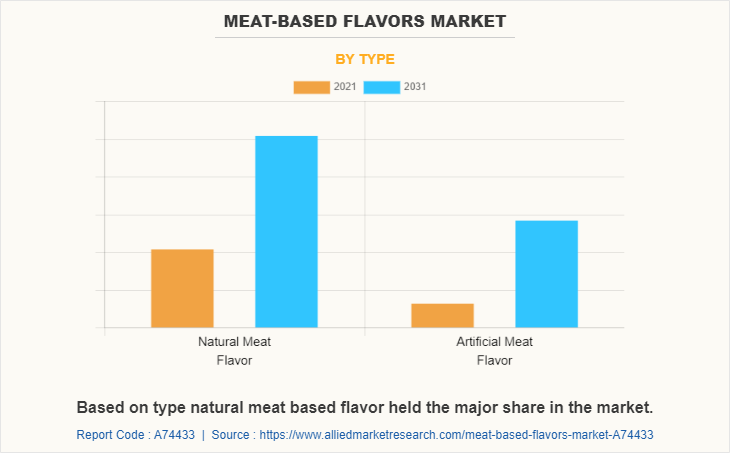
By Flavor
As per flavor, the beef segment held the major share of the market in 2021, as it is used in different types of food products in various industries. This includes the food service industry, such as restaurants & catering businesses, and the packaged food industry, where the beef flavor is used in products such as canned soups & frozen dinners.
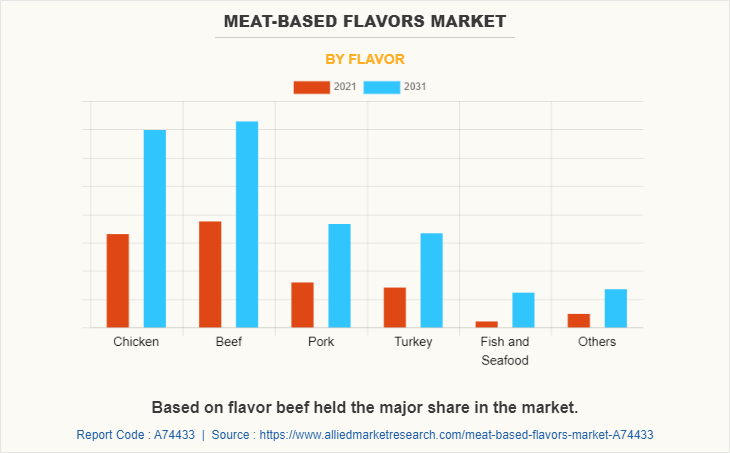
By Application
Depending on application, the soups & sauces segment held the major share of the market in 2021 and is expected to maintain its dominance during the forecast period. Soups & sauces come in a variety of flavors, from traditional beef and chicken broths to more exotic options such as pho and miso. They can be used as a base for stews, casseroles, and marinades, or simply poured over cooked meats to add flavor & moisture.
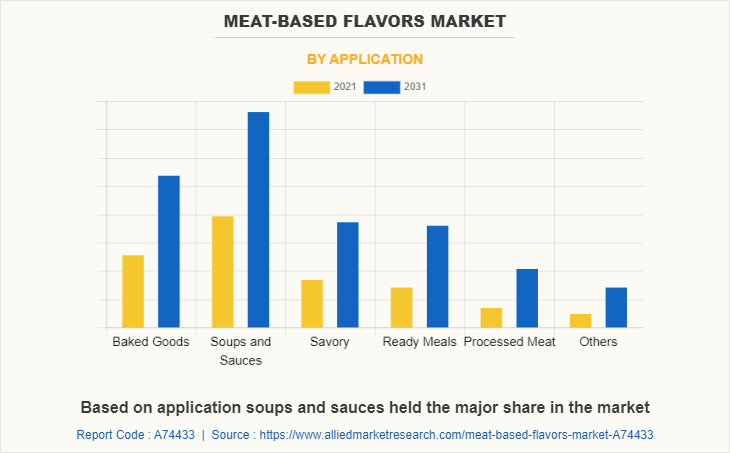
By Region
Region wise, North America was the largest market in 2021. Increase in demand for plant-based and vegetarian alternatives in North America surge the demand for the meat-based flavor market. As consumers become more health and environmentally conscious, they are looking for meatless options that still deliver the taste of meat. This led to the development of new meat flavors through plant-based ingredients such as soy, pea protein, and mushrooms.
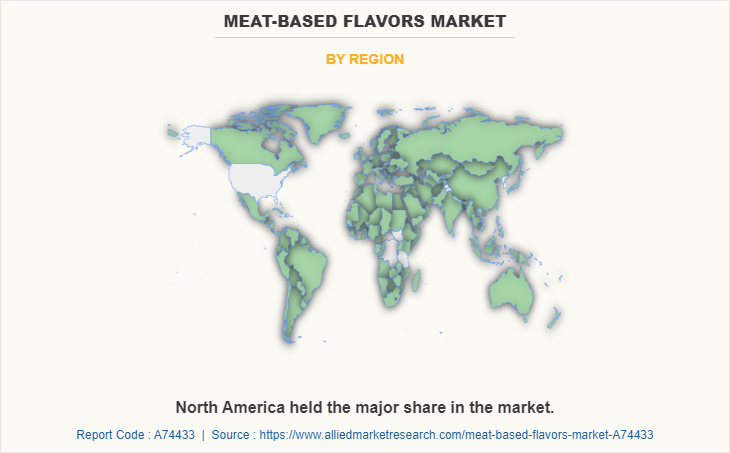
Competition Analysis
The players in the meat-based flavor market have adopted acquisition, business expansion, partnership, collaboration, and product launch as their key development strategies to increase profitability and improve their position in the market.
Some of the key players profiled in the meat-based flavor market analysis include Essentia Protein Solutions Firmenich SA, H.E. Stringer Flavours Limited, Fooding Group Limited, Givaudan SA, Symrise AG, T. Hasegawa Co., Ltd., Kerry Group plc, International Flavors & Fragrances Inc., Koninklijke DSM N.V., Calaf Nuances S.L., P.A. Aromatics Flavors S.r.l., Archer-Daniels-Midland Company, Nikken Foods Co., Ltd., and Sensient Technologies Corporation.
Recent Developments in the Meat-Based Flavor Market
- In May 2022, International Flavors & Fragrances Inc., acquired Frutarom, which is a flavors and ingredients manufacturing company based in Israel. With this acquisition, it will incorporate research and development expertise, broaden its product portfolio, and will further its business presence in the region.
- In April 2021, Kerry Group plc acquired the new Jining Nature Group, which is mainly engaged in providing a range of flavors, seasonings, and prepared food products. This acquisition will expand its customer base and will further strengthen its business presence in China.
- In December 2021, T. Hasegawa USA division of T. Hasegawa Co., Ltd., acquired Mission Flavors & Fragrances, Inc., which provides custom flavor solutions. This acquisition will broaden its current flavors offering and will further its business position in the flavors industry.
- In August 2022, International Flavors & Fragrances Inc., opened a new nourish innovation lab in New Jersey. This new lab focuses on the development of products for food and beverage markets through the incorporation of technologies and ingredients expertise.
- In March 2022, Kerry Group plc launched a new e-commerce platform, KerrySelect.com. This platform focuses on sales of its various products such as flavors and ingredients in the North America region. With this new platform, it will improve customer experience and will further its consumer base.
- In November 2021, Symrise AG launched a range of organic and animal welfare chicken solutions under its Diana Food division. With this launch, it will meet the growing demand for ethical food and drinks market and will further its current product offering.
- In March 2023, Sensient Technologies Corporation launched a new line of flavor solutions, Nacre umami booster extract portfolio. This launch includes products based on extracts from plant proteins., This expanded its current product offerings.
- In June 2021, Essentia Protein Solutions launched a new C3307 Chicken Flavor, under its ProFlavor line. This launch has expanded its current product offering and has furthered its business position.
Key Benefits For Stakeholders
- This report provides a quantitative analysis of the market segments, current trends, estimations, and dynamics of the meat-based flavors market analysis from 2021 to 2031 to identify the prevailing meat-based flavors market opportunities.
- The market research is offered along with information related to key drivers, restraints, and opportunities.
- Porter's five forces analysis highlights the potency of buyers and suppliers to enable stakeholders make profit-oriented business decisions and strengthen their supplier-buyer network.
- In-depth analysis of the meat-based flavors market segmentation assists to determine the prevailing market opportunities.
- Major countries in each region are mapped according to their revenue contribution to the global market.
- Market player positioning facilitates benchmarking and provides a clear understanding of the present position of the market players.
- The report includes the analysis of the regional as well as global meat-based flavors market trends, key players, market segments, application areas, and market growth strategies.
Meat-Based Flavors Market Report Highlights
| Aspects | Details |
| Market Size By 2031 | USD 6 billion |
| Growth Rate | CAGR of 5.8% |
| Forecast period | 2021 - 2031 |
| Report Pages | 442 |
| By Type |
|
| By Flavor |
|
| By Application |
|
| By Region |
|
| Key Market Players | H.E. Stringer Flavours Limited, International Flavors & Fragrances Inc., Sensient Technologies Corporation, Symrise AG, Kerry Group plc, P.A. Aromatics Flavors S.r.l., T. Hasegawa Co., Ltd., Archer-Daniels-Midland Company, Givaudan SA, Firmenich SA, Koninklijke DSM N.V., Fooding Group Limited, Essentia Protein Solutions, Nikken Foods Co., Ltd., Calaf Nuances S.L. |
Analyst Review
Rapid urbanization and globalization along with rise in disposable income play a major role in change in dietary preferences across the globe, which in turn, fuel the growth of the meat-based flavor market. Globalization and interaction between different cultures boost the demand for tasty & highly nutritious food products. In addition, the trend toward clean ingredients is expected to create new opportunities for the meat-based flavor market. Consumers are increasingly becoming aware of the ingredients used in their food products and are looking for meat-based flavors made with natural & clean ingredients.
Westernization of diets in developing countries is most prevalent in the middle-class population. The quick spread of global market chains and fast-food restaurants is strengthening the patterns. Innovation of enhanced flavors and consistent improvement in technology for producing meat substitute products, fuels the growth of the meat-based flavor market. Many companies with promising R&D in various types of meat-based flavors initiatives are expecting a positive response from the meat-based flavor industry.
However, market experts recognize that the meat-based flavor market faces some challenges, such as increase in competition from plant-based alternatives and regulatory restrictions. Overall, market experts see opportunities for growth in the meat-based flavor market, but also recognize the need for companies to be innovative & adaptable to remain competitive in the changing food landscape. Companies that can offer both meat-based flavor products, as well as products made with clean label ingredients, may have an advantage in this market.
The global meat-based flavors industry was valued at $3.4 billion in 2021, and is projected to reach $6 billion by 2031
The global Meat-Based Flavors market is projected to grow at a compound annual growth rate of 5.8% from 2022 to 2031 $6 billion by 2031
Some of the key players profiled in the meat-based flavor market analysis include Essentia Protein Solutions Firmenich SA, H.E. Stringer Flavours Limited, Fooding Group Limited, Givaudan SA, Symrise AG, T. Hasegawa Co., Ltd., Kerry Group plc, International Flavors & Fragrances Inc., Koninklijke DSM N.V., Calaf Nuances S.L., P.A. Aromatics Flavors S.r.l., Archer-Daniels-Midland Company, Nikken Foods Co., Ltd., and Sensient Technologies Corporation.
Region wise, North America was the largest market in 2021
The rising demand for natural and clean-label ingredients, Plant-based meat alternatives
Loading Table Of Content...
Loading Research Methodology...



